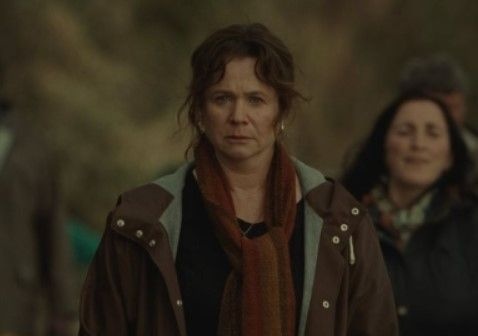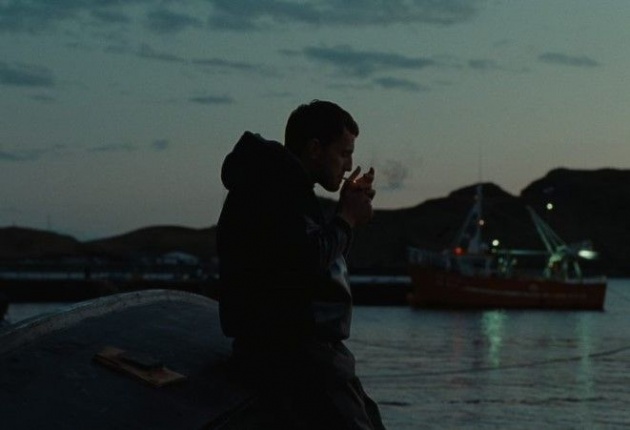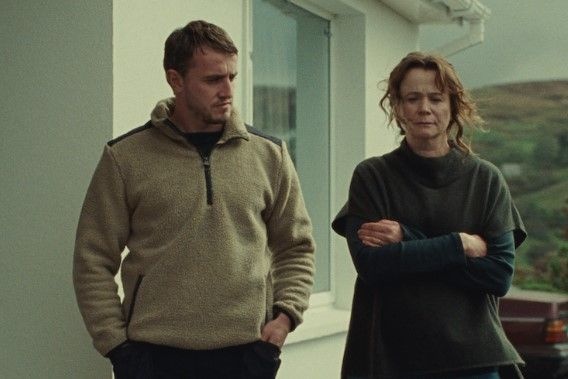
Pictured: Aileen (Emily Watson) is presented with an unpleasant truth in the County Donegal-set drama, 'God's Creatures', directed by Saela Davis and Anna Rose Holmer. Still courtesy of A24 Films (US) / BFI Film Distribution (UK)
Physical activity defined director Anna Rose Holmer’s 2015 feature debut, The Fits, about a pre-pubescent girl training to be a dancer, which she co-wrote with Saela Davis. Davis and Holmer share the directing credit for their overdue (2022) follow-up, God’s Creatures, filmed in County Donegal, Ireland and focusing on a troubled fishing community, equally defined by physical activity. Written by Shane Crowley, the film deals with male violence as enabled by women. A mother, Aileen (Emily Watson) lies to protect her recently returned adult son, Brian (Paul Mescal) when his former girlfriend, Sarah (Aisling Franciosi) reports that he raped her after a night out. Her lie emphasises a dividing line between men and women. However bad you are treated by a man you don’t go to the police.
It begins with a rush of bubbles, churning water and a muffled cry for help. The sea has claimed the life of a young man, the son of Mary Fitz (Marion O’Dwyer), who went out fishing on his own. The community, working for Guiney’s International Sea Food Company, prepares fish and oysters for consumption. There are numerous scenes featuring the un-shelling of oysters and prepared marine produce dropping off the end of a conveyor belt. Supervising the women and often seen with a crate in her hands is Aileen. The preparation of seafood is women’s work. The men catch the fish. Gender segregation is to some extent evident in the local pub. In the early scenes, the work that the women carry out on the line is more interesting to the filmmakers than it is to the audience, but Davis and Holmer emphasise its binding nature, occupying all the adult women in the community, just as fishing – the laying and shaking of nets – consumes the men.
Aileen lives her husband Con (Declan Conlon), adult daughter Erin (Toni O’Rourke), who has recently given birth and raises the baby without involving the father, and father-in-law, Paddy (Lalor Roddy), who has dementia and is uncommunicative. I wondered whether the father of Erin’s child was actually Mary Fitz’s son. No one talks about it. During the wake, Brian returns, having previously migrated to Australia. He doesn’t know that the gathering he has walked in on is a wake. When he realises it, he gives Mary Fitz a hug. Aileen is completely surprised to see her son; she trembles with shock. Brian quickly throws himself into fishing, even partaking in a deal for some salmon, that takes place in a shadowy alley. Presented with salmon at supper time, Con asks ‘where did this come from’, bridling with indignation. There is the suggestion that some of the catch is smuggled out of the processing plant and sold on the side – a huge no-no.
‘We’re all God’s creatures in the dark,’ muses Aileen, meaning that the villagers are beholden to a deity. There is a sense that the sea is a manifestation of a God that punishes errant men. If the Garda doesn’t get you, the water will.
In an early scene, attending to Paddy, Aileen is slapped in the face. She bears the act of violence without reproach. Women are expected to endure harsh actions. There is a quid pro quo in this arrangement. If a woman lies to a police officer, their word is taken as truth. Lies – or the avoidance of truth – is accepted.
At one point, Dennis (Steve Gunn), the manager of Guiney’s complains that a bag of oysters was short. Sarah is accused of syphoning them off. Aileen defends her (‘it was a counting error’). Sarah and Brian have history. She is wary of him.

Pictured: The prodigal son, Brian (Paul Mescal) sparks a cigarette in the Irish drama, 'God's Creatures', written by Shane Crowley and directed by Saela Davis and Anna Rose Holmer. Still courtesy of A24 Films (US) / BFI Film Distribution (UK)
The ‘inciting incident’ occurs roughly one-third through the drama. Aileen and Brian go for a drink. Sarah is sitting at the bar finishing a whiskey. Brian offers to buy her a drink. Sarah initially declines. They exchange polite words. She heads away, popping out for a cigarette. ‘About that drink,’ Brian reminds her. ‘Surprise me,’ Sarah tells him. Brian orders her another whiskey. Sensing that Brian and Sarah are rekindling their relationship, Aileen leaves. Making her way to her car, Aileen passes Sarah. ‘You’ll have to lend me that top,’ Sarah says, remarking on Aileen’s appearance. Aileen acknowledges the request.
Not long after, Aileen is summoned to a police station in town. She is asked to account for her movements on 14 April. She explains that she was home all evening with Brian. Sarah has reported that Brian sexually assaulted her.
The suggestion is that Sarah was in a previous abusive relationship, with the man who presumably got her to filch some oysters. Later, she remarks how all the villagers knew he was abusive. Why didn’t they say something?
Reeling from the incident, Sarah misses work – we later learn that she misses 12 out of 14 shifts. ‘Why didn’t you phone in sick?’ Dennis asks her. As a consequence of being a rape victim, Sarah is made redundant.
The lack of conversation between the women on the seafood preparation line is a metaphor for their silence in the face of male violence. They bow their heads and get on with their work.

Pictured: Brian (Paul Mescal) and his mother Aileen (Emily Watson) in a scene from the fishing community-set drama, 'God's Creatures', written by Shane Crowley and directed by Saela Davis and Anna Rose Holmer. Still courtesy of A24 Films (US) / BFI Film Distribution (UK)
But what of Brian? Do we believe that he is a rapist. The way Mescal is directed to play him, he doesn’t portray any sense of wrongdoing. We don’t see him express upset that his ex-girlfriend accused him in this way, nor that he is nursing a sense of remorse. He doesn’t even reflect on the fact that his mother lied on his behalf to protect him. It is just expected, part of the code of silence.
In one striking scene, Brian achieves something that has eluded his parents. He gets Paddy to sing. Aileen is incredulous to see them singing together. When Brian breaks off from singing and starts up again, after a silence from Paddy, he joins in again. ‘You see there’s nothing wrong with him,’ Brian crows, pleased with himself.
The lie doesn’t fool anyone. Aileen is sent home from work by Dennis and upsets Erin by collecting the baby from day care. ‘You’re not his mother,’ she cries, snatching the child from Aileen’s arms. Erin is, by suggestion, appalled by the way in which her mother has protected her brother. She is wary of him – they don’t really speak. There is the suggestion that he migrated to Australia to escape and may have returned because he continued to exhibit disturbing behaviour.
The investigation into Sarah’s allegation ends unsatisfactorily – for Sarah at least. At a second wake, Sarah shakes Con’s hands, ignores Aileen and spits into Brian’s face. Aileen apologises to Sarah, but it isn’t what Sarah wants. At the climax of the film, while Aileen lies on her back in a boat, the sea enacts justice denied by the courts.
If Aileen hadn’t lied, could she have prevented a tragedy? Possibly. The point of the drama is that if women adhere to a culture of silence at the expense of other women, they don’t really save their men.
Fresh from his Oscar nomination for Aftersun, Mescal is the main draw. I watched the film in a near full matinee screening. However, at the time he was cast in God’s Creatures, Mescal hadn’t achieved the level of celebrity that both Aftersun and the television series Normal People have given him. Davis and Holmer don’t showcase him as a star. Instead, they focus on Watson’s performance as a mother whose conformity is instinctive. We don’t identify with her, but we understand her choice.
Although the film fixates on toxic male behaviour, it does not suggest an alternative. Rather it suggests that punishment is inevitable. This is a fanciful idea. There are plenty of men around the world committing or having committed appalling crimes who may never face justice and indeed cause more suffering because they are unchecked. It is not enough to hope for a divine deus ex machina. Davis and Holmer view human behaviour from a distance, paying homage to Bertolt Brecht’s estrangement theory. The less we empathise with characters, the more we see how governing systems work. Developing viewers’ critical thinking has its purpose, though is not always compatible with entertainment.
Reviewed at Glasgow Film Festival (Scotland), Friday 3 March 2023, Glasgow Film Theatre, Screen One, 15:30 screening



